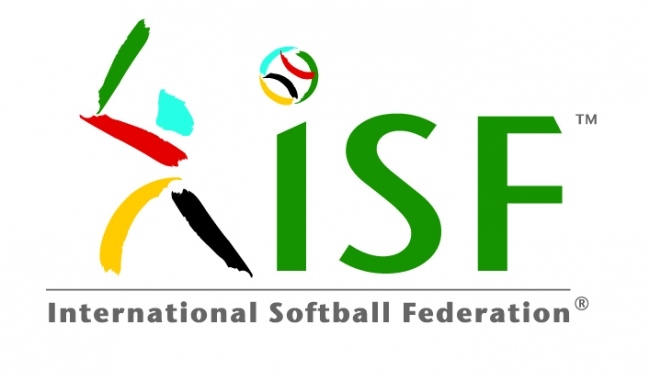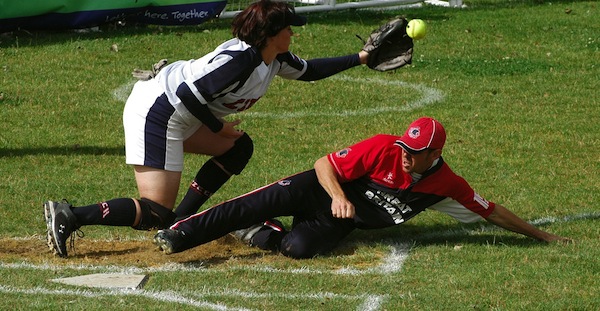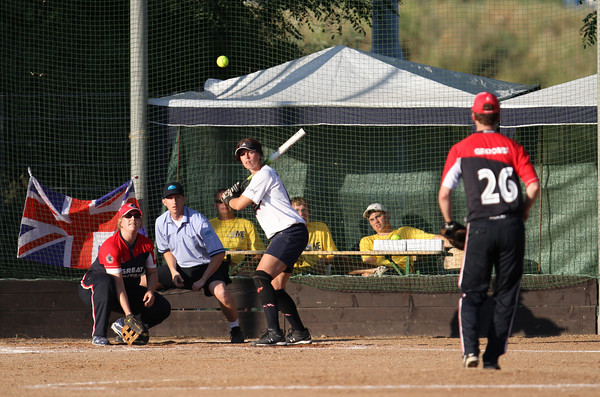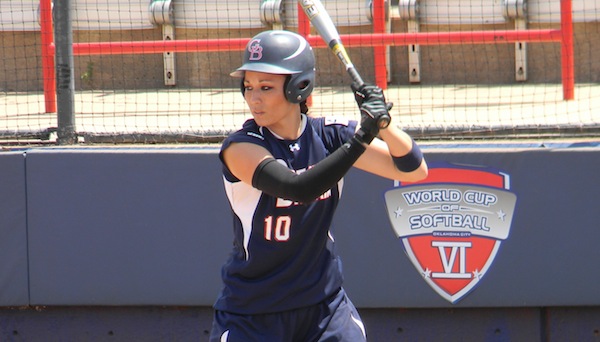 Slowpitch softball was given unusual prominence at the International Softball Federation's 25th biennial Congress, held from October 26-29 in Oklahoma City in the United States. Delegates from 70 countries were in attendance, with President Stella Ackrell and Treasurer Mike Jennings representing the British Softball Federation.
Slowpitch softball was given unusual prominence at the International Softball Federation's 25th biennial Congress, held from October 26-29 in Oklahoma City in the United States. Delegates from 70 countries were in attendance, with President Stella Ackrell and Treasurer Mike Jennings representing the British Softball Federation.
Slowpitch Task Force
Following a request from the American Amateur Softball Association (ASA), a special Slowpitch Softball Task Force met on October 29 at the Congress, chaired by John Austin from Softball Ireland, who has recently taken over from Bob Fromer as the European Softball Federation's Slowpitch Development Officer.
With around 25 people in attendance, John was able to circulate and collect questionnaires on slowpitch activity and aspirations from more than 15 countries to provide information on which future action plans can be based.
There was enthusiasm from a wide range of countries at the meeting for slowpitch development, and the ISF has been asked to identify a Slowpitch Coordinator for each ISF region.
Although we don't have this problem in Britain, representatives from Combat Sports told the Task Force meeting that fastpitch and baseball players who tended to look down on slowpitch as a recreational and one-dimensional game often changed their minds when they started to play it. The legendary USA fastpitch pitcher Lisa Fernandez now plays and loves co-ed slowpitch, and there was a suggestion that participation by prominent fastpitch and baseball players in different countries could help change the way that slowpitch is perceived.
Slowpitch growth can be helped by the fact that many countries have an aging demographic, with government funding available to get adults playing sport. Slowpitch can also tap into corporate participation and funding, as it has in the UK. And there is evidence that a great deal of slowpitch play exists outside Federation structures in various countries, and Federations have every incentive to bring those players, teams and leagues into the fold.
Another way to help the growth of slowpitch, the meeting agreed, is to have international competition to provide aspiration, and for federations to put more stress on the competitive side of slowpitch instead of seeing it mainly as a recreational game.
A BSF suggestion that a Slowpitch World Cup be scheduled for 2014 to give countries time to promote and plan attendance was accepted, and Britain has pledged that the GB Slowpitch Team will compete in the event and will actively pursue involvement from other continents.
Slowpitch softball might also be promoted through inclusion in Special Olympics events. A representative from the Special Olympics spoke at the Task Force meeting, and the BSF will pursue possibilities of working with the Special Olympics in Europe. One benefit of doing so is that the Special Olympics has significant funding at its disposal, but another is the chance to attract new athletes and their "playing buddies" -- often siblings -- to the game.

Slowpitch rules and coaching
Another promising development with regard to slowpitch revealed at the Congress is that a large number of slowpitch-specific rules are being added to the Q&A database on the Umpire School website that can be accessed through the ISF website.
When changes are made to the ISF Rulebook in 2013, amendments will be made to better incorporate slowpitch rules into the document, and the BSF will make try to be at the forefront of that effort.
There was discussion at the Task Force session about slowpitch pitching regulations, since 6-12 feet is the standard pitching height in Europe and in the ISF Rulebook, but 7-10 feet is much more prevalent in North American leagues.
A new portable bat-tester was presented and demonstrated at the Congress, and the BSF might consider buying one to have a more consistent way to measure the legality of bats in BSF competitions.
It was clear in discussions at the Congress between BSF representatives and some of the Combat Sports coaches who ran batting clinics in England and Ireland earlier this year that these coaches are keen to come back to Britain, Ireland and Europe in the near future. Discussions will be ongoing about the best way to configure future coaching visits.
Olympic reinstatement
 A key fastpitch issue at the Congress was whether softball’s drive for Olympic reinstatement should be conducted jointly with baseball or whether the two sports should pursue reinstatement separately.
A key fastpitch issue at the Congress was whether softball’s drive for Olympic reinstatement should be conducted jointly with baseball or whether the two sports should pursue reinstatement separately.
After several years during which the International Baseball Federation (IBAF) took the initiative in pushing for a joint bid, the two sports have begun working together in recent months, driven in part by the IOC's insistence that sports bidding to join the Olympic programme must have male and female versions.
It has been proposed that IBAF and the ISF create a new jointly-owned entity to make a baseball-softball bid and to run baseball and softball events at the Olympics if the bid is successful, with no other change to the structure of either Federation. If a joint bid fails, this entity would be dissolved and the status quo would be resumed.
The vote at Congress showed about 70% of countries want to work towards a joint Olympic bid with baseball and Europe was overwhelmingly in favour, though the United States and Canada spoke against the proposal. How the ISF Board will now act on this mandate remains to be seen.
Fastpitch changes
With Olympic reinstatement in mind, there was some discussion at the Congress about innovations that could make women's fastpitch softball more attractive to spectators and to television, including changing the scoring system to give points for baserunners and speeding up the substitution process to avoid extended breaks in the action during games.
But no final decisions were made on these ideas for the moment, nor on a proposal to open up the Women's World Championships to any country that wanted to enter, as was the case before 1998.
Two changes that will be debated when the Rulebook is revised at the Congress in 2013 will be an increase in the pitching distance for youth fastpitch from 40 feet to 43 feet for safety reasons, and allowing metal cleats in Under-19 as well as senior play.
The rules on jewellery may also be relaxed in 2013 so that only items likely to pose a danger to other players will be banned.
One change already made by the umpire community is that all ISF umpires will need to be re-certificated in each four-year Rules cycle.
ISF finances
Mike Jennings was the only person to ask questions about ISF finances in the Congress plenary session, and his intervention led to a commitment to make ISF financial information more transparent in future. A review of ISF income and expenditure from 2004-2010, which Mike had prepared in advance of Congress in order to make the debate more productive, achieved its desired effect.
ISF First Vice President Dale McMann, who led the finance session, has long fought to make the ISF more accountable to member Federations with regard to financial information. And he has tried hard to get everyone to recognise that with the loss of Olympic funding, anything spent out of ISF reserves is gone and can never be recovered.
McMann disclosed to the Congress that an intended outcome of $100,000 in operating profit in the current financial year was more likely to be a $200,000 loss -- a variance of $300,000 from budget. Post-Olympics, the ISF has only minimal income streams from Federation membership and sponsors, and its income is derived mainly from interest on its reserves, now around $6.5 million. But with interest rates low and losses on investments unpredictable, it's clear that the ISF at last has to trim its expenditure in line with reduced income prospects.
Going forward, the ISF Executive will now constitute the Finance Committee that approves expenditure, and a quarterly review system will be introduced. Even though an expensive Olympic reinstatement campaign may be coming up, the aim is that ISF reserves will never be allowed to drop below $5 million.
Athletes and Women in Sport Commission
BSF President Stella Ackrell was Vice-Chair of the ISF's Women in Sport Commission, which held a joint session on October 29 with the Athletes Commission.
In summary, the Commission agreed to:
- Increase communication about relevant issues between member federations, for example by setting up a Facebook group.
- Increase the availability of different types of tools to teach and implement softball in schools.
- Create an area on the ISF website where different Federations can add their teaching materials for softball and Federation contacts.
- Increase cooperation and the exchange of information between Federations in the same ISF region.
- Implement the Athlete Outreach Programme.
- Implement a feedback mechanism to bring back updates and actions resulting from this meeting to the Congress in 2013, allowing continuity between Commissions meetings.

Competition Awards
The Congress voted on venues for upcoming ISF competitions, and confirmed that Europe will host the ISF Women's World Championship for the very first time when the event is staged at Haarlem in the Netherlands in 2014.
Whitehorse, Canada, which is hosting the Women's World Championships in 2012, was successful in its bid to host the Junior Men’s Fastpitch World Championship in 2014.
Saskatoon, Canada will host the 2015 Men’s Fastpitch World Championship.
Hall of Fame
New inductees to the ISF Hall of Fame, as voted by the Hall of Fame Commission and approved by the Congress, are:
Players: Peta Edebone (Australia), Linda Marie Ford (Bahamas), Paul Maisey (Australia), Robert “Chubb” Tangaroa (New Zealand), Ray Tilley (Canada), Gina Weber (New Zealand).
Coaches: Alfred “Ali” Culmer (Bahamas), Bob Harrow (Australia), Ramon Lopez (Venezuela), Hung-Cheng Tseng (Chinese Taipei).
Administrators: Juan Manuel Arambula (Mexico), Franco Caverzan (Venezuela), Guller Eriksen (Denmark).
Meritorious Service: Russell Moffat (New Zealand).
Next Congress
The location for the next ISF Congress in 2013 -- which will be both an Election Congress and a Rules Congress -- came down to a knife-edge vote between the Czech Republic capital Prague, bidding to host the first ISF Congress to be held in Europe, and Cartagena, Colombia.
Cartagena gave the delegates special incentives to vote for them by promising to cover all costs for accommodation, food and internal transport for sightseeing, an offer that Prague couldn't match. And there was even a rumour that the Colombians were offering to pay for delegates' flights, which may have added an element of confusion to the vote.
The vote went to Cartagena by just 75-73.

